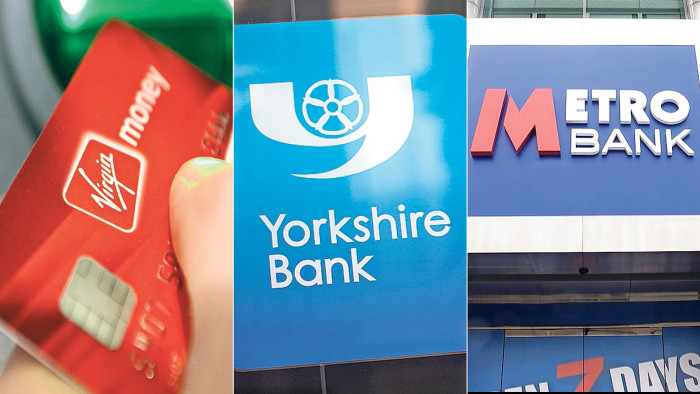A taxpayer safety net that assists Metro

Roula Khalaf, Editor of the FT, selects her favourite stories in this weekly newsletter.
Any day now, unless something goes terribly wrong, lucky investors will get another chance to indulge hope over experience in bank shares as Metro Bank joins the list of challengers to the fat five in the public markets. Those other little challengers, Aldermore and Virgin, have managed to stay above their offer price, which is an achievement of sorts, but Metro is rather more challenging in all sorts of ways.
It is not as other banks, as an analysis from FT Alphaville’s Kadhim Shubber clearly shows. Metro likes loud locations. These draw in deposits but conventional lending has proved more, well, challenging, and much of the cash is used to buy bonds (but see below).
The brash branches are designed by the wife of Vernon Hill, Metro’s American chairman, and she must be pretty good since she’s been paid £11.8m since 2009.
Mr Hill himself has what is cautiously described as a colourful past in banking back home, which may be contributing to the low-key launch of the shares, in contrast to the razzle-dazzle of the branches — sorry, “stores”. Rather than an offer for sale, the shares are to be “introduced”, sliding quietly on to the market, with only existing shareholders being tapped for new capital. For a business supposedly about to command a value of £1.7bn, this is highly unusual. At the very least, it does not suggest confidence that investors will love Metro the way the depositors are being asked to.
Those depositors are fully protected up to £75,000, thanks to the free insurance policy provided by the UK taxpayer. Without it, all the challengers would find life tougher, since they would have to persuade depositors that their money was as safe as in the “too big to fail” big five.
The Centre for Policy Studies argues that this safety net should be removed and that banks should be obliged to buy the insurance they currently get free. Were this done along the lines of the Shipowners’ Club, the market could price the risk.
If a bank found the required premium so high as to threaten its business model, it might be time to find a different model.
Save money — keep your cash at home
Just when you think bond yields cannot go any lower, down they go again. According to JPMorgan, half the government bonds in the eurozone now trade on negative yields, guaranteeing losses if held to repayment. This phenomenon reflects the growing trend for central banks to charge depositors for holding their money.
We are only starting to understand life below the “zero bound”. For example, a bank which takes in deposits and buys bonds can either buy negative yielding high-grade debt that will not cover the deposit when it is redeemed, or choose lower grade debt with the raised risk of default. Should the bank try and charge for simply keeping our money, we would take it out in cash and put it under the mattress. There is the problem of storage, of course. Oxford Economics has helpfully worked out that a billion dollars in $100 bills fills 12 cubic metres but £1m in new fifties for your spare change would go into a 15cm cube, small enough to fit under the bed.
Unfortunately, cash doesn’t work on the internet and, besides, the designs keep changing. Unlike, say, the central bank of Belgium, the Bank of England has always honoured its notes, however out of date. Still, hauling in your treasure chest and asking for £1m new-for-old notes might invite a few questions, at the very least.
Another crack in the reactor
Chris Bakken is abandoning his post as project director of Hinkley Point and is off home to America. He said: “This is a critical time for the industry,” adding: “But trying to work with the UK and French governments and the Chinese state is enough to drive a man insane.” Well, no, he did not add that but perhaps he thought it. Last week EDF, the Hinkley reactor’s French builders, funked pressing the button and this week a spokesman said the project was “reaching a final investment decision soon”. How about: Let’s call the whole thing off.
Comments